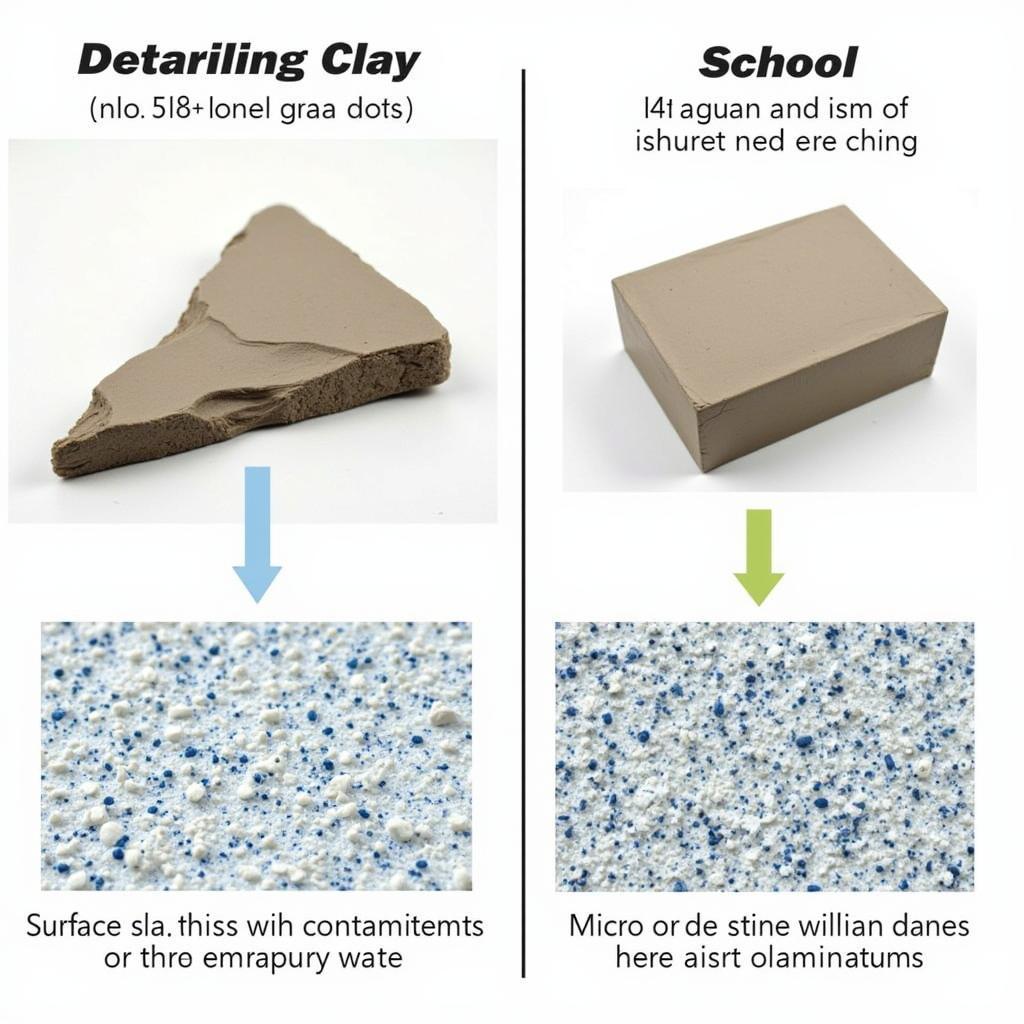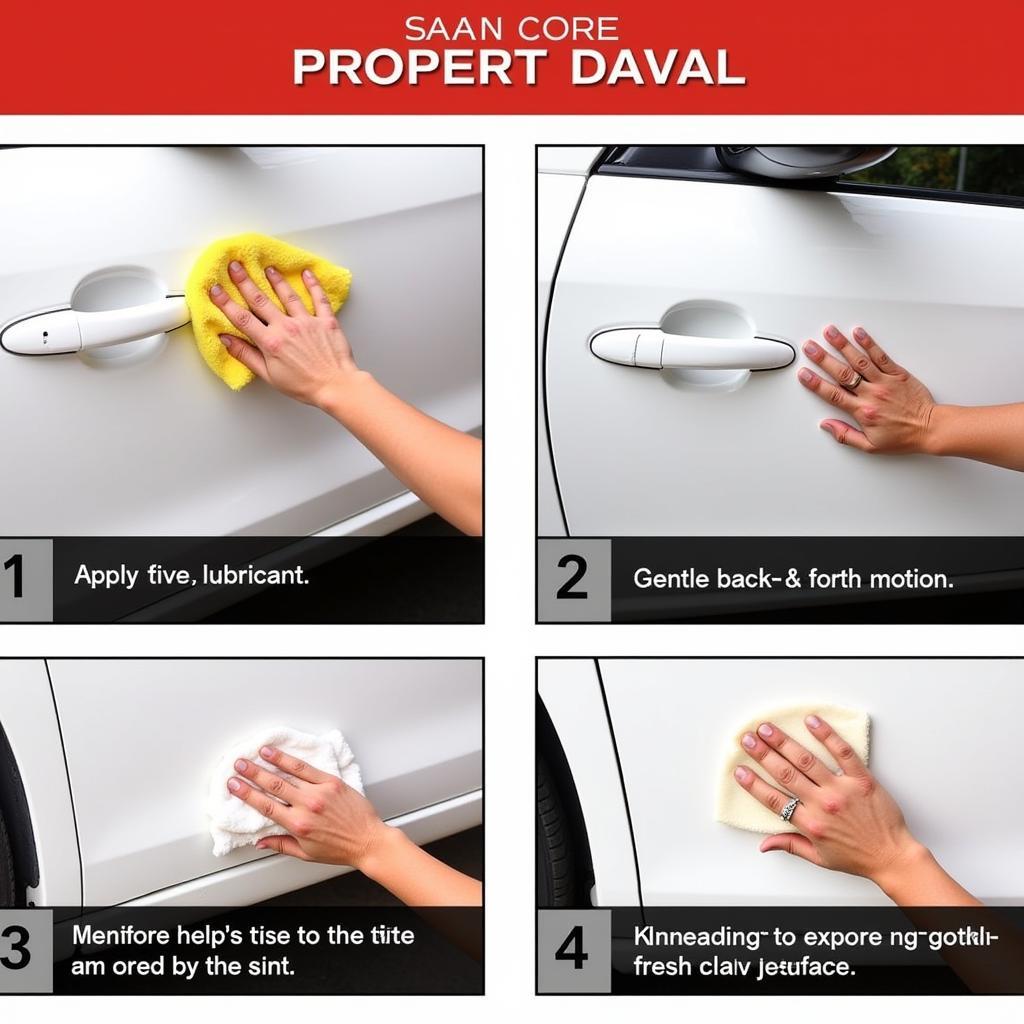Using the wrong clay on your car’s paint can lead to swirl marks and scratches, undoing all your hard work. So, can you use regular school clay for detailing cars? The short answer is a resounding no. While they might look and even feel similar, school clay and detailing clay are vastly different. Using the wrong type can damage your car’s paint, leading to costly repairs. This article will delve into the differences between these two clays and explain why detailing clay is the only safe option for your vehicle.
Why School Clay is a No-Go for Car Detailing
School clay, also known as modeling clay, is designed for art projects, not car care. It’s typically oil-based and much harder than detailing clay. This hardness can be abrasive on your car’s delicate paintwork, leading to fine scratches and swirl marks. Furthermore, school clay is not designed to pick up contaminants; instead, it tends to smear them across the surface, exacerbating the problem. Imagine trying to clean a window with a brick – you’d end up doing more harm than good.
The Science Behind Detailing Clay
Detailing clay, on the other hand, is specifically formulated to be gentle on car paint. It’s typically made of a synthetic polymer material that’s much softer and more pliable than school clay. This allows it to safely lift contaminants like embedded dirt, brake dust, industrial fallout, and tree sap without scratching the surface. Think of detailing clay like a microscopic sponge that grabs onto these particles and pulls them away.
 Detailing Clay vs. School Clay
Detailing Clay vs. School Clay
How to Use Detailing Clay Properly
Using detailing clay requires a lubricant, usually a dedicated clay lubricant or a quick detailer spray. This lubricant creates a slick surface, allowing the clay to glide smoothly over the paint and preventing it from sticking or marring the finish. Always work in small sections, kneading the clay frequently to expose a clean surface. Once the clay glides smoothly and picks up no more contaminants, that section is clean.
 Using Detailing Clay Correctly
Using Detailing Clay Correctly
The Cost of Using the Wrong Clay
While detailing clay might seem like an additional expense, using the wrong type of clay can lead to much more costly repairs. Scratches and swirl marks caused by school clay often require professional polishing or even repainting to correct, potentially setting you back hundreds or even thousands of dollars. Investing in the right detailing clay is a small price to pay for protecting your car’s finish and maintaining its value.
Different Types of Detailing Clay
Even within the realm of detailing clay, there are different grades available, from fine to medium to heavy-duty. Fine clay is best for light contamination and regular maintenance, while medium and heavy-duty clays are reserved for more severe cases of embedded contaminants. Choosing the right grade depends on the condition of your car’s paint.
Conclusion: Invest in the Right Clay for a Pristine Finish
Can you use regular school clay for detailing cars? Absolutely not. Using school clay on your car is like using sandpaper to clean your eyeglasses. Detailing clay, while slightly more expensive, is specifically designed to safely remove contaminants and leave your car’s paint looking pristine. Invest in the right tools and techniques, and your car will thank you for it.
FAQ
- What is detailing clay? Detailing clay is a synthetic polymer material used to remove embedded contaminants from car paint.
- Why can’t I use school clay? School clay is too abrasive and can damage your car’s paint.
- How often should I use detailing clay? It depends on the condition of your paint, but generally, every few months or before applying wax or sealant.
- What do I need to use detailing clay? You’ll need detailing clay, a clay lubricant, and microfiber towels.
- How do I know if I need to use detailing clay? Run your hand over the clean, washed paint. If it feels rough, you likely have embedded contaminants.
- Can I reuse detailing clay? Yes, as long as you knead it frequently and keep it clean.
- Where can I buy detailing clay? Detailing clay is available at most auto parts stores and online retailers.
If you need further assistance, feel free to contact us via WhatsApp: +1(641)206-8880, or Email: [email protected]. Our customer support team is available 24/7.

Leave a Reply